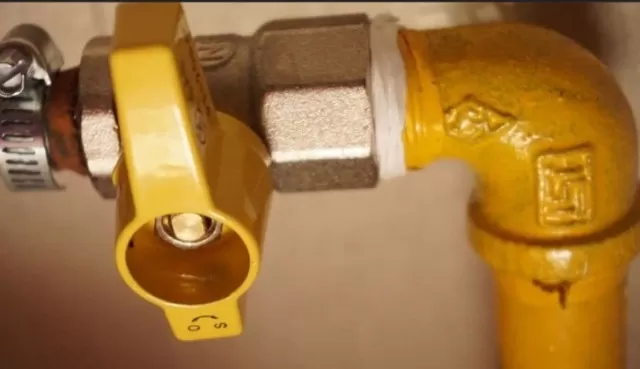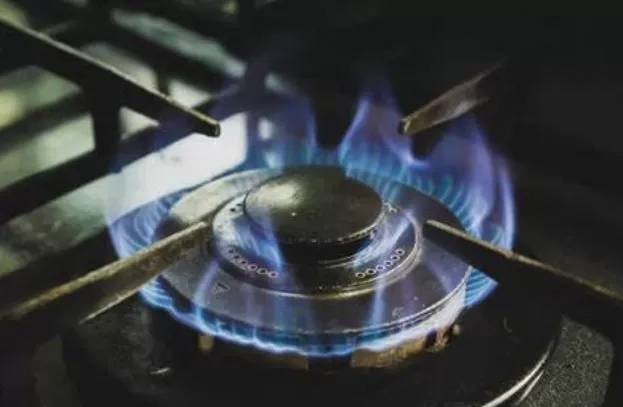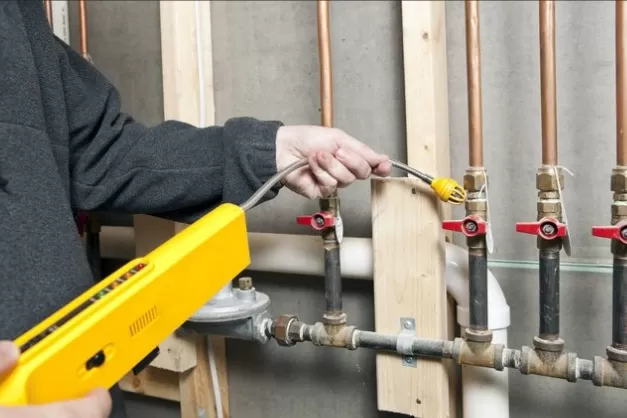Detecting Danger: Solved! The Smell of a Gas Leak Revealed. Detecting the distinct smell of natural gas and knowing how to respond in the event of a gas leak is essential for ensuring your safety and the well-being of those around you. Here’s A Guide on how to detect the smell of natural gas and what steps to take in case of a gas leak:
Exploring Various Methods for Identifying Natural Gas Leaks at Home and the Importance of Prompt Response

In order to safeguard our living spaces, it is crucial to understand the multiple techniques available for detecting natural gas leaks within our homes.
While humans and animals rely on oxygen for survival, the influx of gas caused by a cracked pipe, a leaking fireplace, or a faulty appliance can displace the oxygen due to the higher density of natural gas and propane. As the oxygen levels decrease, individuals may begin to experience physical manifestations of gas exposure, such as queasiness, headaches, and respiratory difficulties.
In more severe scenarios, one may even lose consciousness and face the risk of suffocation.
Hence, it becomes essential to be able to identify the indicators of a gas leak. By utilizing our senses of smell, sight, and sound, we can promptly detect these distinct warning signs and take immediate action.
By honing our olfactory senses, we can rely on our ability to detect the distinctive odor added to natural gas, providing an early indication of a potential leak.
Additionally, visual cues such as hissing sounds, discolored vegetation, or unusual fog-like formations around gas lines or appliances can further confirm the presence of a leak. Furthermore, auditory clues like hissing or whistling noises emanating from gas pipes or damaged equipment can serve as an audible alarm, urging us to investigate further.
Recognizing the gravity of these symptoms, it is imperative to take swift action upon detecting any of these telltale signs.
Swift response includes alerting the relevant authorities, such as emergency services or the gas company, and vacating the premises if necessary. Additionally, turning off the gas supply and refraining from using any electrical devices or open flames can help prevent potential ignition or explosions.
To ensure the safety and well-being of ourselves and our loved ones, familiarity with these diverse methods for detecting gas leaks is of utmost importance.
By equipping ourselves with knowledge and swift response tactics, we can mitigate the risks associated with natural gas leaks and create a secure environment within our homes.
Responding Swiftly to a Gas Leak in Your Home: Ensuring Safety and Minimizing Risks

When faced with the detection of a gas leak within your home, it is crucial to prioritize immediate action.
Gas leaks pose significant health hazards and can jeopardize the safety of your living space. However, before proceeding, it’s important to ascertain whether the smell of gas near an appliance is simply due to a pilot light being extinguished or a partially open burner valve.
Ensure to check for these possibilities before proceeding with further steps.
If you determine that the gas leak cannot be attributed to an open burner or an extinguished pilot light, it becomes imperative to act swiftly.
Follow these essential guidelines to safeguard yourself and others:.
Evacuate the area: Leave the vicinity where you smell, hear, or see the gas leak.
The primary objective is to distance yourself from the potential danger.
Seek professional assistance: Contact 911 or your local gas company immediately.
Inform them about the situation, providing accurate details to enable them to respond promptly and effectively.
Avoid potential sources of ignition: Refrain from using any electrical equipment or lights that could generate a spark, including matches, lighters, switches, doorbells, thermostats, elevators, appliances, and telephones.
Additionally, extinguish any candles, fireplaces, or open flames in the vicinity.
Maintain a safe distance: Do not position or operate vehicles or powered equipment near the suspected gas leak.
This precautionary measure helps minimize the risk of ignition.
Keep others away: Ensure that people and pets are kept at a safe distance from the area where the gas odor is present.
This reduces the likelihood of exposure to the gas and potential harm.
Immediate evacuation if necessary: If the odor of gas is strong and pervasive, it is crucial to evacuate the home promptly.
Ensure that everyone remains outside the premises until it is deemed safe to return.
Follow professional advice: Do not attempt to operate the gas valve or re-enter the home until authorized by the gas company.
Trust their expertise and wait for their confirmation that it is safe to do so.
By adhering to these guidelines and responding promptly, you can mitigate the risks associated with a gas leak, prioritize safety, and ensure the well-being of yourself and those around you.
Remember, quick action is key when dealing with gas leaks, and seeking professional assistance should always be a priority.
Swift Response to Home Gas Leaks: Protecting Health and Ensuring Home Safety

It is crucial to act swiftly and decisively if you discover a gas leak within your home.
Gas leaks pose significant risks to both your well-being and the safety of your living environment. While the presence of gas smells near an appliance may be attributed to a simple issue like an extinguished pilot light or a slightly open burner valve, it is important to verify these possibilities before proceeding.
Here’s what you should do if you detect a gas leak in your home that cannot be explained by such factors:.
Prioritize safety: Recognize the gravity of the situation and prioritize your safety, as well as the safety of others in the vicinity.
Take immediate action to address the potential danger.
Assess the situation: Confirm that the gas odor cannot be linked to an open burner or an extinguished pilot light by conducting a thorough check of all gas-powered appliances in your home.
If you find no obvious source for the gas leak, proceed with caution.
Evacuate the premises: If you are certain there is a gas leak, evacuate the area immediately.
Leave the home and ensure that everyone else inside also exits promptly. Creating distance from the gas leak is essential to minimize the risk of harm.
Seek professional assistance: Contact emergency services or your local gas company without delay.
Inform them about the gas leak, providing accurate details to help them understand the urgency and severity of the situation. They will provide guidance and take appropriate action.
Avoid potential ignition sources: Refrain from using any devices or activities that could potentially ignite the gas, including electrical equipment, light switches, matches, lighters, open flames, or anything that may generate sparks.
This precautionary measure helps prevent accidents and further danger.
Prevent vehicular and equipment risks: Do not operate any vehicles or powered equipment near the suspected gas leak, as they can potentially trigger ignition.
Stay clear of such activities until the situation is resolved.
Keep others away: Ensure that family members, visitors, and pets are kept at a safe distance from the affected area.
Restricting access to the vicinity of the gas leak minimizes the risk of exposure and potential harm.
Wait for professional clearance: Do not re-enter the home or attempt to fix the issue yourself.
Wait for professional guidance and clearance from the gas company or emergency responders before returning to the premises.
Remember, acting swiftly and responsibly is crucial when dealing with a gas leak.
By following these steps, you can prioritize your safety and the safety of others, mitigating the risks associated with gas leaks and ensuring the well-being of everyone involved.
.
.
*The information is for reference only.